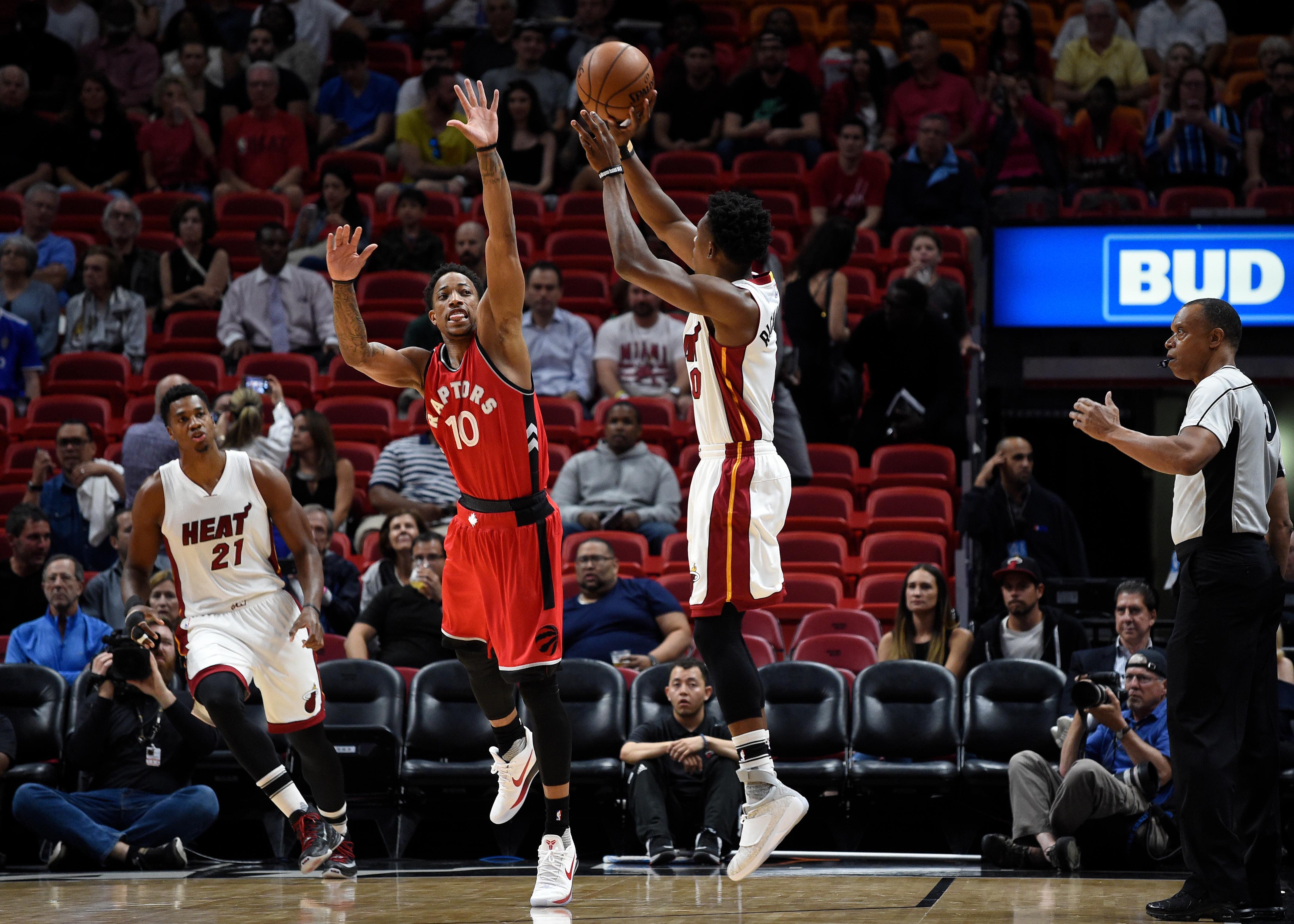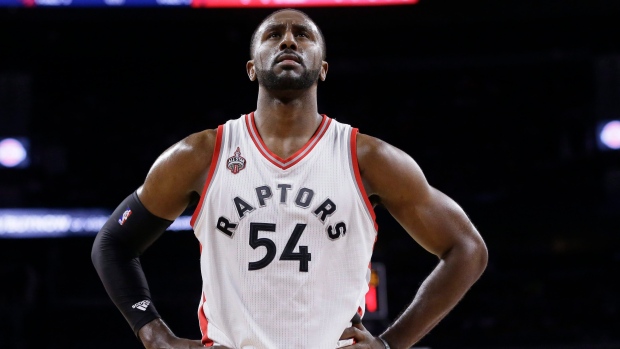Raptors 101, Heat 84 | Box Score | Quick Reaction | Reaction Podcast
At some point this season, head coach Dwane Casey may figure out what his Toronto Raptors dislike so strongly about first quarters. At home or on the road, healthy or banged up, with any number of players starting at power forward, the Raptors can’t seem to get out of their own way early in games. There are a lot of plausible explanations – missing a pair of starters probably doesn’t help, though they’ve been mediocre in first quarters all year – but Casey would almost surely ascribe the slow starts to energy, force, or any number of other words that essentially point to giving more damns. Whatever the case, it’s exhausting, even when they find said damns and it winds up being just fine.
In their second visit to South Beach in as many weeks, the Raptors replayed one of their worst starts to a game yet this season. On March 11, the Heat built a six-point first-quarter lead and the Raptors gave in shortly thereafter, turning in one of their worst second quarters of the season and then handing proceedings over to the bench. On Thursday, still down Kyle Lowry with a suspended Serge Ibaka joining him on the sidelines, things looked equally bleak, with the Heat opening up a 33-23 lead and pushing it to 15 shortly thereafter.
The team from twelve days ago, though, was the pre-players-only meeting team. If the team truly believes their post-Thunder-drudging conversation was a turning point for their constitution, then the turnabout in Thursday’s game makes sense, however unlikely it may have seemed. Rather than bend, the Raptors pushed back against one of the hottest teams in the NBA, on the road, without two of their most important players at either end of the floor.
This time around, it was a desperate but banged-up Heat team that couldn’t effectively counterpunch an opponent’s best shot, and a slow-boiling Raptors comeback eventually crescendoed into 27-7 second-half run. From the first quarter onward, the Heat found resistance on the perimeter, resistance at the rim, and resistance moving the ball. Miami shot 32.8 percent over the final three quarters, their hot start from outside withered into a 6-of-23 night from long-range, and they wound up scoring fewer points – in total and per-possession – in any home game all season.
Like the Raptors in the last meeting, the Heat briefly pushed back late but ultimately ceded the game. The end result was a 101-84 victory that should stand as one of Toronto’s most impressive when regular season schedules are reflected upon in a few weeks’ time.
The script, of course, is a bit concerning, as early deficits will become infinitely more difficult to come back from in the postseason. But the Raptors are playing without anything resembling a full deck right now, and while the Heat are in an even more precarious position in that regard, there is plenty to appreciate about Toronto taking care of business in the way they did here. The realities of life without Lowry have been written about plenty by now – the Raptors are now 10-5 since he underwent surgery and 11-5 without him on the year – but Ibaka has been an enormous part of the team’s new defensive success. Missing both stood as a difficult challenge. (Bruno Caboclo is also away with Raptors 905, and he has the best net rating on the team. Tough times.)
Those absences shift a large burden to depth pieces who are not normally accustomed to it. Masai Ujiri and company have opted to build the NBA roster such that it’s competitive now and also stocked with prospects for down the line, inexpensive pieces who keep the franchise in a position of long-term health. The risk with this strategy, and the concern as injuries mount, is that it’s fairly likely that over the course of 82 games, young players will be relied on more than they may be by a traditional contender that fills out its roster with grizzled veterans.
It was those young depth pieces that answered the call and swung Thursday’s game dramatically. Jonas Valanciunas struggled early on and was outplayed by Hassan Whiteside, and so the team leaned heavily on Jakob Poeltl. Poeltl is hardly flashy, but his smart play, defensive versatility, and sneaky offensive rebounding were a perfect fit for an energetic second unit. Cory Joseph wasn’t at his best opposite Goran Dragic, either, and Delon Wright shook off a pair of bad games in his last three to decidedly steady his ship, playing one of his best games yet off the bench. The Utah teammates were plus-30 and plus-26 in 23 and 24 minutes, respectively, remarkable totals that essentially credit the stretches they were on the floor for changing the game.
Norman Powell brought a much-needed scoring punch, and Patrick Patterson made up for another cold shooting night but attacked the glass with abandon, too. Depth is crucial over an 82-game season, and it’ important a team have faith in the guys at the end of the bench. There’s a reason they’re there, and so things won’t always be smooth or seamless, but the Raptors have some very nice young players who have now swung a couple of meaningful games when the players ahead of them were absent in body or just in spirit.
It takes 15, as they say, and getting these kind of contributions in the regular season is important. It’s important not only for getting the wins now, but for building the confidence of and learning about the rookies and sophomores, as the team saw with Powell a year ago. In an ideal world, Poeltl and Wright won’t see the floor in the postseason. It’s still important that there’s a modicum of faith and some evidence that they can contribute against one of the hungriest, gutsiest teams in the league. That’s valuable experience and valuable knowledge.
Okay, so, we’re guilty of burying the lede here: The bench players were great, as was P.J. Tucker, but this was once again the DeMar DeRozan show. How is it we go 800 words into a recap without mentioning him? Because IT DOESN’T MATTER…
.@klow7 ladies & gentlemen. 😂 #WeTheNorth pic.twitter.com/5Km4GnSF2k
— Toronto Raptors (@Raptors) March 24, 2017
Of course it matters, Lowry’s joking aside. DeRozan was phenomenal once again in putting up back-to-back 40-point outings for the first time in his career. It’s the sixth time he’s dropped 40 this season, a franchise record (the Raptors are, naturally, undefeated in those games), and this may have been his best pure scoring game yet. DeRozan shot 14-of-25 from the floor with an array of turnarounds, floaters, and drives, and the Heat, one of the better and more aggressive defensive teams in the league, had little answer. Rodney McGruder worked his tail off trying, Whiteside hung near the rim, James Johnson had a good possession or two, and still, there was no slowing DeRozan. He took 13 free throws, dished three assists as he once again expertly worked around traps and blitzes, and he chipped in on the glass. He is doing literally all that could be asked, and more. There aren’t words left for his offense this year.
DeRozan was also very game on the defensive end once again, which may be the most notable part of the #PlayersOnly turnaround. The defense was trending upward before that closed-door chat, but Tucker was open in his challenge for DeRozan to be better and communicate more on that end, and he’s certainly answered the call of late. With Tucker setting the tone (and Ibaka when he’s present), DeRozan, Powell, and a number of others stepping up their effort at that end has had an infectious trickle-down effect. It’s not about DeRozan so much as the message it sends and the tone it sets. Clearly, it’s working.
That the Raptors have survived without Lowry is great, and they’ve performed beyond any reasonable expectation. That the defense has trended upward is a major relief, if an expected one. That both of those things held true when Ibaka sat a game is incredibly encouraging. The Raptors are good, tough, and resilient, as they showed on a night like Thursday. It makes it easy to dream on just how good they may be if Lowry can get back in the fold ahead of the postseason.



